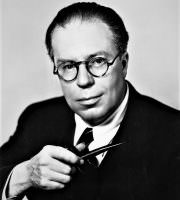by James McAuley
I. Proem
The world's the thing; Mercator its false prophet;
We scramble on a flat projection of it.
But oh the foggy Greenlands of the soul!
The monstrous malformations round the Pole!
Mercator, merchant, I have burned your chart.
In three dimensions is my sailing art,
To search a world unsimplified, and find
A desperate North-East Passage of the mind.
Captain I am, and would be master too,
Though Shem and Plumb are of my sullen crew
With Sigmund the guardian; bickering we sail
Where Boreas woos his sea-nymph in a gale.
And if my Esperanza go astray,
Seek me within some silent Lapland bay
Where once they found that knight, Hugh Willoughby,
With frozen hand still on his diary.
II. Song Of Shem
When our beasts low in their stalls
And rain renews its antique mode
My superstitious spine recalls
The earth's diluvian episode.
What men were they before the flood?
What speech, what barter then obtained?
What man was I? And did my blood
Freeze then, as now, when the sky rained?
What women, coins, and statues then
Dissolved into that dreadful ooze?
What kings unknown to later men?
What giant lustful residues?
And did we then find grace in living
In some accustomed, unblest way;
Heedless that God was unforgiving,
Not looking for a likelier day?
My thoughts are wrecked upon that sea,
The hauntings of a drowned man's cry:
While Ham and Japhet spread the tea
And Noah hangs his clothes to dry.
III. Plumb
Nietzsche respected the great god Plumb
That lays his pipes in a baby's tum.
Beneath our logic's pure avowals
He heard the murmur of the bowels.
What beauty is, and truth, we learn
By gazing on that Grecian urn
The sovereign digestive tract,
Sole arbiter of faith and fact.
The colon is our River Nile,
Conduit of culture, the grand style,
And every barefoot god or nymph
Is nascent in our human lymph.
Plumb has the cosmos in his fist,
Thought's eternal pragmatist,
And poetry does what it can
To justify his ways to man.
Nietzsche respected the great god Plumb
Whose logos issues from his bum.
IV. The Tramguard's Songs
1.
"Love that can on absence feed
Is the world's great household need."
Thus sang a tramguard in my ear
When last I left my lady dear.
And all night long the tramguard's words
Sang in my sleep like pleasant birds.
Next morn I wrote them with good heed
For every passenger to read.
2.
Be kind to self, have no hard dealing:
In self-forgiveness lies sweet healing,
Self-forgiveness of each vice
Unlocks the gates of paradise.
He who himself will not forgive
Will never let his brother live,
But he who bears a little sin
Will live in peace with kith and kin.
V. The Voices In The Room
Shem:
The moon steps clear from the cloud that rained,
White and naked as Susanna from the pool;
And I in my youth become an impotent elder.
Tramguard:
Your indoor games are tedious,
Playing hide-and-seek with your pet selves.
(You should have seen the one that got away!)
Shem:
Tonight the sudden rain disturbed my peace
With memories that I have not desired:
The creaking of the cordage—wind in the sails—
Old Noah quarrelsome and amorous—the dark
Alive with the hot smell of beasts—the flood
Unloading us on barren Ararat.
I have no ease—
Tramguard:
Your childhood's innocence, a ghost-voice,
Breathes in your bones like winds
That moan in hollow flues.
Shem:
And now the moonlight leaning on the sill,
Grown lecherous with caressing night, becomes
Irrepressible nude bodies tumbling
From the antique cornucopia
Into my barren room.
Nightlong they talked, the lodgers of my house
Whom I have given the comforts of a home;
Nightlong I listened for I could not sleep.
VI. The Family Reunion
I woke to find the tramguard looking grim,
Punching his tickets all around the room;
Plumb was defiling his end of the bed;
And Shem was up to something in the gloom—
I won't mention what. So I called out: Please,
There's a lady coming. Shem, you answer the door;
Sigmund (that's the tramguard's name) be quiet;
And Plumb, get out of bed and clean the floor.
That's how we play happy families.
But when you came, they took their cue from me;
To see us then, you'd almost have supposed
That we were all that we're cracked up to be.





